Weekly Newsletter From 2 To 8 October
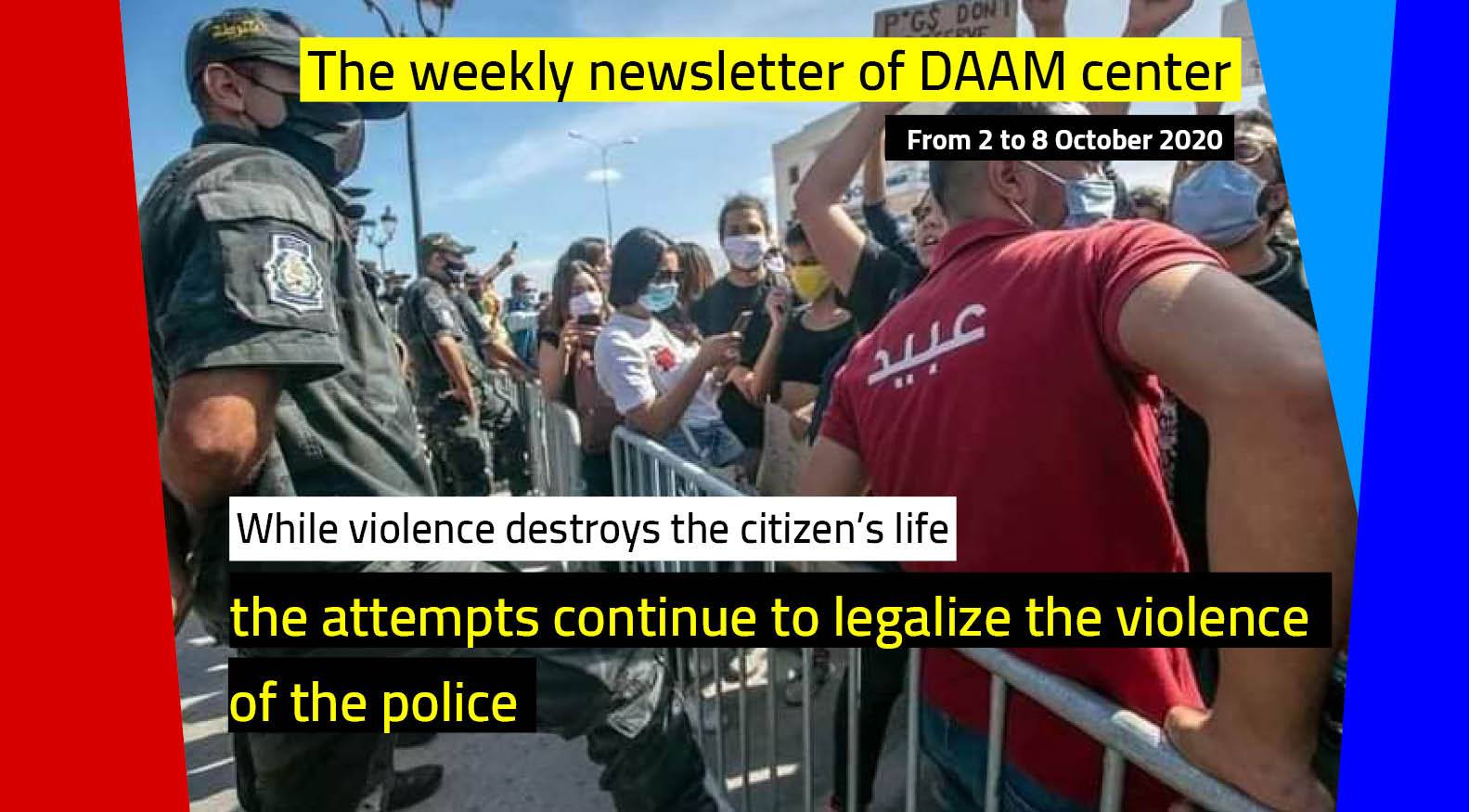
This post is also available in:
![]() Arabic
Arabic
Egypt
Parliamentary elections in Egypt: a meaningless news under repression and parliamentarians’ corruption
On the legislative level: National Elections Authority, NEA head Lasheen Ibrahim and deputy president of the Court of Cassation, officially announced the final list of candidates for the elections of the House of Representatives after completing the review of all judgments which were issued by the Supreme Administrative Court of the State Council.
The final list included 4,032 candidates for the Parliamentary elections by the individual system, and 8 lists by the list system which contain 284 main and replacement candidates for the legislative elections, after changing the characteristics of some candidates and their party affiliations, as well as some parties request to replace some of the candidates with others.
Concerning the details of the political life which is related to parliamentary elections, the Supreme State Security Prosecution decided to imprison the lawyer Tariq Jamil Saeed pending investigations in reports which were submitted by members of political parties, accusing him of insulting and defamation. That happened after Saeied published a live video from his car criticizing the candidates of the parliament. The security services had arrested Saeed after the prosecution issued a decision to arrest and bring him. And the Administrative Judiciary Court rejected the case demanding the annulment of the decision to exclude his name from the voters’ lists.
The Court also ruled to exclude Said Hassassin from running for the upcoming elections of the House of Representatives, and accepted the lawsuit which was filed by a lawyer and pharmacist with the same request, and not to include Hassassin in the lists of candidates.
In the same context, Counselor Mahmoud Fawzi, Secretary-General of the House of Representatives, sent a letter to the Egyptian Olympic Committee which headed by Hisham Hatab, after the committee requested the appearance of the Chairman of the Board of Directors of the Zamalek Club and the deputy of the Council, Mortada Mansour, for investigation in the Olympic Committee without requesting the House of Representatives. The House of Representatives stressed that the member of the parliament has parliamentary immunity whether substantive or procedural which is regulated by the Egyptian laws. The Parliament notified the Olympic Committee that no measures may be taken against a member of the Council, except after an issued decision by the House of Representatives to do so in accordance with the provisions of the law.
The Egyptian Olympic Committee decided to suspend Mortada Mansour, president of the Zamalek Club and a member of the Parliament, for 4 years from practicing any sporting activity in Egypt, with a fine of 100,000 Egyptian pounds.
It is noted that since Murtaza Mansour joined the parliament, requests to lift his immunity have been pursued for investigation in a large number of cases, exceeding the number of 12 requests which were rejected by the parliament.
Al Awamiyah village in Egypt: Egypt is always in revolt
The confrontations between the families and the security forces continued and intensified after a police officer in a security forces in the investigation department and Central Security murdered 38-year-old Ewais Abdel Hamid al-Rawy, an employee at the Luxor International Hospital and father of two children and a third baby is expected to be born, in front of his home at dawn on Wednesday.
Murdering Ewais came after a series of events that began with the participation of the citizens of the Al Awamiya village in the demonstrations of September. As a result, the security forces began launching daily arrest campaigns against the citizens of the village. According to two residents, the number of the arrested persons in the village ranged between 14-18 persons and they are in unknown places.
In one of the arrest campaigns, a security force went to the al-Rawi family’s home at dawn on Wednesday, the 30th of September in search of his cousin, Diaa al-Rawi. And when the forces did not find him, they decided to arrest Eweys’ younger brother Al Rawi Al Rawi. The family tried to discourage the force from arresting the young man, but they refused and escorted him outside. And according to the witness of two neighbours, one of them was in front of the house as soon as he heard the shots, Ewais came out behind them, and after an altercation between him and one of the force officers, the officer removed his weapon and fired four bullets, including a bullet that hit Eweis in the head.
After Rawy’s murder, a number a number of angry young residents abducted at least three police secretaries, holding them hostage for several hours in protest of Rawy’s murder and kidnapping his body. And after negotiations between the residents and the security force to release the police personnel in exchange for the release of the body. And one of Rawy’s neighbors said that the families gathered during the two hours following the murder. And one of the people estimated their number as thousands.
When the caravan carrying Rawy’s body arrived in the Al Sanayi square at the people waiting for the funeral , it was flanked by a police vehicle and an armored car, which began shooting tear gas into the crowd, said three residents who attended the funeral.
Al-Awamiya Village: Impunity for the perpetrators is an ongoing reality
After the funeral, security forces put the village on lockdown. Clashes between the protesters, who used molotov cocktails and bricks and the security forces, who used tear gas.
These events are similar to what happened previously in the village, when residents protested the murder of a citizen called Talaat Shabeeb Al Rashidi, a 48 years old man who was tortured and killed at the police station one hour after his arrest from a cafe near his home.
The former presidential candidate, Hamdeen Sabahi, commented on the murder of Ewais al-Rawi, and posted on his Facebook page a picture of the victim with his child, commenting, “How will this child grow up unless justice is not achieved for this man’s blood?”. Sabahi added, “Ewais Al-Rawi is a martyr of dignity who was murdered by an authority of low dignity, competence and morals which spreads injustice, hatred and pushes the homeland into the abyss”.
The Egyptian Public Prosecution : A unique Prosecution that justify repression
The Attorney General stated in a statement that the Public Prosecution had decided to arrest the dead and others of his relatives to interrogate them in the charges of committing terrorist crimes due to the investigations of the National Security Sectors. The “Public Prosecution” was notified of his death after he tried to resist the police force that went to his house and his family, who were wanted to be arrested by the permission of the Public Prosecution. He resisted the force by using a gun machine that was seized next to his corpse.
The statement added that the Prosecution confirms that all the news on social media and various news sites concerning the incident are fake. According to the statement, in the investigations of the Public Prosecution, his father denied any assault against him by the officers or the security personals who are responsible for implementing the permission of the Public Prosecution, in contrast to what is falsely reported about the allegation of this assault. Every time, the Public Prosecution in Egypt justifies violence, and avoids opening any serious investigation. The Public Prosecution promotes impunity which led to make the security forces above the law and away from accountability. On the other hand, targeting journalists continues in arresting Basma Mustafa, the journalist who took the initiative to cover the events of the village of Awameya.
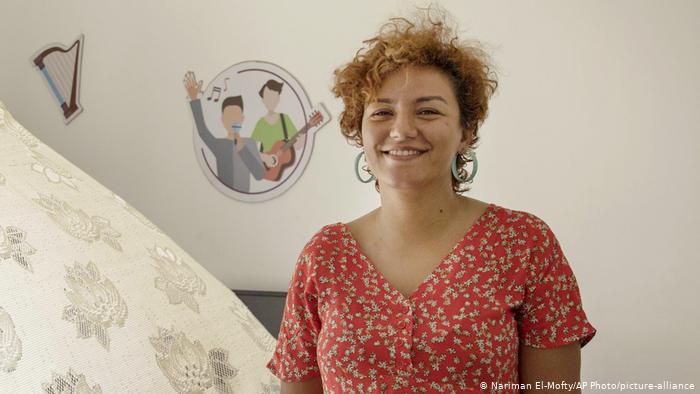
The Egyptian Public Prosecutor, Hamada El-Sawy, had announced the release of journalist Basma Mostafa after the decision on Sunday 10/4/2020 to imprison her for 15 days pending investigation.Basma had disappeared while working in the village of Awamiya in the Luxor, to cover the news of murdering Ewais Abdul Hamid Al-Rawi, then Basma appeared in the Supreme State Security Prosecution. She was accused of using her personal account in one of social media websites to spread and publish false news that would disturb the general security.
The Attorney General stated In a statement which was published on his official Facebook page, that the journalist had denied the accusations, and that the prosecution tried to search for the account, and it was found “ineffective,” and Basma denied her knowledge of the reason.
The statement indicated that the investigation is still ongoing, despite the decision to release her. The Egyptian Organization for Human Rights and a number of political and human rights figures demanded the release of Basma, accusing the authorities of restricting the freedom of the press.
The human rights newsletter in Egypt: Repression, repression and repression…
The Giza Terrorism Criminal Court, the Second Circuit, sentenced 11 accused persons to strict imprisonment of 15 years and four juniors were sentenced to 3 years and one was acquitted in the case known in media as the dispersal of the al-Nahda sit-in.
The Supreme State Security Prosecution imprisoned hundreds of citizens who were arrested due to September 20 events in case no. 880 of 2020 by the state security for a period of 15 days.
Meanwhile, the Criminal Court decided to release the film producer, Moataz Bellah Abdel-Wahab, on his accusation of spreading false news in the case no.586 of 2020.
Renewing the imprisonment continues against human rights lawyer Amr Imam, Muhammad Samir, the blogger Radwa Muhammad, the journalist Ahmed Shaker, the journalist Sulafa Majdi, the student Muhammad Fadi, the student Omar Khaled and the lawyer Mahienour Al-Masry pending investigations in case no.488 of 2019 of the State Security.
The Supreme State Security Prosecution renewed the imprisonment of the Journalist and researcher Shaima Sami for 15 days pending investigations in Case no.535 of 2020 of the state security, without her appearance before the prosecution. And it also renewed the imprisonment of the journalist Islam Al Kahly for 15 days pending investigations in case no.855 of 2020 of the State Security, without his appearance before the prosecution.
Enforced disappearance: a systematic and continuous practice
After his enforced disappearance that lasted for more than a month after the decision to release him in case no.621 of 2018, Walid Shawky, a dentist and former member of the April 6 Youth Movement, appeared today before the Supreme State Security Prosecution, which decided to imprison him for 15 days pending investigations in another case (880 of 2020). Shawky faced charges of joining a terrorist group, spreading false news, misusing social media, and participating in a gathering. The prosecution had also previously used the “revolved doors” against Shawqi’s colleagues in his old case, lawyer Sayed Al-Banna, the publisher Ayman Abdel-Moati, in Case no.880 of 2020, after the legal period for pretrial detention expired.
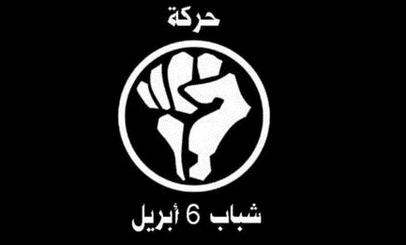
Last Monday, the Second Circuit of the Cairo Criminal Court renewed the imprisonment for 45 days against the labor activist, Khalil Rizk Khalil, in Case no. 1475 of 2019, and the journalist Hassan Qabbani, pending investigations in case no.1470 of 2019, and the researcher Ibrahim Ezz El-Din, in Case no.488 of 2019. That is a clear example of the deterioration of economic and social rights in Egypt.
Center for Trade Union & Workers Services (CTUWS) shed light in its report entitled “The Conditions of Egyptian Workers in Light of the Corona Crisis and Future Prospects”, concerning the companies and factories that arbitrarily dismissed their employees during the Corona pandemic.
The report mentioned that despite all the statements which were announced by senior officials in the state regarding the necessity to preserve employment, not reduce salaries, and take all precautionary measures in work areas, the decisions of businessmen came in contrary to that and even violated labor law and international agreements.
The monitoring shows that workers suffered from severe measures which affected directly and quickly their economic and social conditions. The report mentions a number of factories and companies that carried out arbitrary dismissal.
In the same context, Mona Mina, a former member of the Egyptian Medical Syndicate Board, said that the Public Prosecution released Dr. Alaa Shaaban, who was imprisoned for six months in case no.558 of 2020. She is a doctor at El-Shatby Hospital in Alexandria, who was arrested on the 28th of March because she allowed a nurse to use her phone to inform the Ministry of Health of a suspected case of corona in the hospital. And the director of the hospital considered that as a breach of his terms of reference, and contacted the National Security Agency, who arrested her from his office. Shaaban is one of the other doctors who were arrested by the authorities on the background of reporting cases of negligence on various hospitals in the Corona epidemic.
The repressive regime continues its repressive policy against doctors and workers, while the number of the victims among doctors who face the Coronavirus, reached 183, according to the Egyptian Medical Syndicate page.
Tunisia
Political life: democracy is in crisis and increasing sectionalism
During the last days of this week, the Parliament is discussing during laws which have a great importance. The first one is the law which is related to the Constitutional Court that has been proposed since July 2020. The goal of the amendment is to accelerate the formation of the government according to the Democratic Bloc and the Ministry of Justice which suggest the proposal. In addition to the law against assaulting security personnel, which raised controversy and rejection among the Tunisian public opinion, fearing from the return of police repression.

On Thursday 10/8/2020, the session was adjourned due to the lack of a required quorum for voting on the basic Laws, i.e. 109 votes. This session witnessed a procedural flaw which is related to presenting the problem to the Parliament’s office. This contradicts the provisions of Chapter 109 of the Parliament’s rules of procedure.This chapter stipulates that the referral is one of the powers of heading the plenary session, either to move to discuss chapters one by one, or to return the project to the committee, or to defer consideration of it to a later session.
Despite the presented arguments to accelerate the voting, the time of the amendment raises serious questions which are related to the political conflict among the authorities, especially between Parliament and the Presidency of the Republic. The President is considered the symbol of the state and the guardian of the constitution according to it. So he is the authority for interpretation in the absence of the court (the Constitutional Court). The past period witnessed a struggle over interpretation which has an impact in the political interests and positions of the parties in the ruling system.
Meanwhile, the Tunisian street moved to reject the law that criminalizes assaulting security forces, despite its amendments since 2015.
The aforementioned law raises problems concerning its focus on the clear punitive nature in it, as expressions of “twofold penalty” are repeated while ensuring that the security personnel hasn’t a responsibility for his actions. In addition, the generality of the formulation and its imprecision may subsequently pose serious problems in law enforcement. Besides that law is far from other necessities which are associated with it such as reforming the security system, the judiciary and the administration due to the weak oversight of the parliament. As the Parliament has no real capabilities in imposing this oversight due to the technicity of the security and military fields.
Amnesty International considered that members of the Parliament should reject such a bill that would enhance impunity for security forces and protect them from any criminal responsibility for using lethal force to protect security installations.
On the other hand, a number of youths and representatives of civil society organizations protested in front of the subsidiary building of the Parliament against the aforementioned law. MP Yassin Al-Ayari joined the protesters who raised many slogans against the bill, which raised great controversy, stressing that it would limit freedom of expression and media and oppress citizens.
The Tunisian public is outraged by the videos of the protest. The security forces used violence to disperse the demonstrators. Many citizens were also arrested.
Parliament: sterilization against the virus and against insulting and swearing
Since the morning of Monday, the 5t of October of 2020, the headquarters of the parliament has a sterilization campaign for all its passages and corridors, in addition to the plenary hall. It is reported that 25 individuals of the Parliament’s administration and workers were infected with CoronaVirus.
The first plenary session of the new parliamentary year, which was devoted to the dialogue with the government about the health, social and educational situation in the country, witnessed verbal altercation and an exchange of accusations between the head of the Free Constitutional Party bloc, Abeer Moussi, and the head of the Dignity Coalition, Saifuddin Makhlouf.
Executive authority: the news of appointment … news of positions
The official Printing office of the country issued a set of orders to appoint a number of advisors in the office of the prime minister, in addition to the secretary general of the government, Walid al-Dhahabi who would have the rank and privileges of the minister.
A decision was also issued to appoint the former Ambassador Elias al-Gharyani as an advisor to the prime minister in charge of diplomatic affairs and he started his responsibilities on September 21.The former governor and former general secretary of the Labor Union, Salim El-Tissawi, was appointed as an advisor of social files on September 21, which was the same date on which the discussion started about the possibility of appointing both the former governor of the central bank, Tawfiq Bakkar and the advisor to the president of the republic in the previous regime, Munji Safra, as advisors for Al Mechichi . It is reported that the Minister of Culture, Walid Al-Zaidi, was dismissed.
Concerning the Presidency, on Tuesday afternoon, the 6th of October of 2020, the President, Kais Saeied, received at the Carthage Palace, the Minister of National Defense, Ibrahim Al-Bartaji. During the meeting, they talked about the incident of a military plane, “F-5”, in the Ramada region in the south of Tunisia, which was carrying out an operational mission in the desert and it resulted in the death of its pilot.

The President expressed his sincere condolences to the family of the martyr and to all the members of the military forces, stressing, on the occasion, the great role played by the sons of the military forces in land, naval and air forces. In this context, he stressed the need to be fully informed about our armed military forces, including social information, and to provide all conditions that enable them to work in the best conditions.
The President referred to the importance of renewing the fleet of aircrafts and to improve the equipment of the military, stressing his keenness on the necessity of providing the necessary funds in order to achieve the needs of the military institution.
The covid crisis: a comprehensive crisis and interim solutions with an economic and social problems
The medical intern at Hospital Fattouma Bourguiba Monastir, Nasreen El Amdouni, confirmed last Monday that the hospital’s working conditions, especially in the covid department, are very difficult and catastrophic, saying that there is a severe shortage of oxygen devices and Pulse Oximeter Blood Oxygen, in addition to the absence of ECG devices which made it difficult for Medical and paramedical personnels and endanger patients’ lives.
She also confirmed that the necessary medicines were not provided, which prompted her to bring medicine from her home, in an attempt to secure the shortage.
Meanwhile, the head of the Syndicate of Private Pharmacies Owners indicated that a large number of vaccines supplements had been lost in pharmacies since the spread of the Coronavirus, after the demand for them had multiplied about 10 times.
Due to the worsening epidemiological situation in the country, Prime Minister Hisham Al-Mechichi approved a set of measures on Saturday evening, the 3rd of October. The most important of the precautionary measures are the compulsory wearing of the face mask and physical distancing, as well as the rotational work of the employees in public office and the prevention of all cultural and sporting events. A curfew was also imposed starting on Thursday 10/8/2020 from nine pm to five in am.
The Human Rights newsletter: An Escalating Human Rights Demands and Limited Policies
The Main Syndicate Grain mill workers carried out a general strike on Tuesday, the 6th of October, 2020, with all units of the Grain Bureau at the central and regional levels. This strike is against the failure of the reconciliation session at the General Labor Inspection between the General University of Agriculture and the Department of Grain Bureau in the presence of the supervisory authority. And in this session, they didn’t reach consensus concerning the points which were listed in the strike regulations, including the main system and the status of contract workers.
The General Federation of Secondary Education officials called, in a statement on Tuesday 10/6/2020, for all teachers to implement a suspension of classes on Friday the 9th of October 2020, protesting against the ministry’s failure to adhere to its pledges to secure the educational process that preserves the right to education and the right to health and safety.
According to the statement, the suspension of classes would not be accompanied by meetings or gatherings in the halls of professors “to protect teachers and to be abided by the precautionary measures”. So the strike would be by leaving the institution as a “symbolic withdrawal”.
35 lawyers are organizing a sit-in in the lobby of the Republic Agency in the Court of First Instance in Ben Arous, to protest against the Public Prosecution that didn’t issue arrest cards against those who were accused of assaulting the lawyer Nisreen Garnah, after the camera recordings proved her exposure to assault, detention (Kidnapping) and that is an evidence against the accused persons.
The head of the Tunisian Association of Young Lawyers, Tariq Al-Harakati, confirmed that the defense body of the lawyer Nisreen, had seen the recordings of the surveillance camera that “proved without any doubt that a number of crimes occurred inside the police station in Al-Morouj against their colleague, which is considered as a severe violence (beatings, suffocation, detention, closure to the door of the police station during work time, breaking the phone, and destroying the evidences of the crimes by deleting clips from the videos).
Professor Mohsen Kabouj, the general clerk of the regional branch of lawyers in Monastir, confirmed that the council of the regional branch of lawyers in Monastir which is held on an emergency basis on Friday evening, the 2nd of October of 2020, decided to carry out an attendance strike on Tuesday and Wednesday, the 6th and 7th of October 2020, in the Court of First Instance in Monastir.
This decision comes after reviewing the health situation, the dangerous outbreak of the Covid 19 epidemic, and the tremendous increase in the number of infections and deaths that have become daily in dozens at the national level generally and in the governorate of Monastir with its various neighbourhoods particularly. This matter may lead to a serious humanitarian catastrophe according to Professor Mohsen Kabouj.
The Syndicate of Engineers announced, in a statement, a general strike in the presence of all the engineers of public institutions and installations on Tuesday, the 27th of October, to demand the special increase that engineers enjoyed in public office under the agreement on the 5th of September of 2019.
Moreover, the Syndicate stressed that this action is against the “continuous deterioration of the material and moral condition of the Tunisian engineer in general and of the engineers of public installations and institutions in particular”.
It added that in the absence of an urgent response by the government to their demand, the public sector engineers “may escalate their actions until their demand is achieved and justice prevails.
The workers of the company “SOTRAFER”, since last Friday, continue to carry out an open sit-in at the railway station in Al-Mitlawi, and the private Radio stations Syndicate denounces the government’s negligence to implement the agreed measures to save the institutions and their workers.
As for the employees and agents of the regional transport company of Sfax ” SORETRAS“, since midnight yesterday, they have entered an open-ended strike. That strike included urban transport, regional transport and inter-city transport in order to protect the public facility and the sustainability of the institution after the deal to transport workers and agents of the chemical complex in Skhira was assigned to a private transport company. That happened for the first time in half a century, as the regional transport company of Sfax took over the transport of personnel and agents 50 years ago.
The proposed law, known as the “Repression of attacks against armed forces” bill: Why Shouldn’t It Pass?
In a tense environment over the “Repression of attacks against armed forces” bill, a citizen was assaulted with verbal and physical violence at the end of the past week by a security agent who stopped him on a patrol that was checking papers.
Anani ( the citizen ) added that he had argued with the policeman about the reason for the seizing of his papers, and he was confronted verbally and physically by the security agent. Some bystanders documented the assault incident, which included insulting the citizen by the security agent and insulting God and dragging by force to the police car. However, the citizen confirmed that despite submitting a complaint to the Public Prosecutor in Nabeul, he later found himself summoned to appear before the judge as an accused person in a complaint From the security agent himself.
The activist and human rights defender Maryam Al-Baribri was referred to the Public Prosecution of Sfax 2 after hearing her with the judicial police force in Sfax, in a complaint filed against her by the general secretary of the National Security Syndicate in the same aforementioned region. The activist’s lawyer explained that the complaint filed against Maryam Al-Baribri was due to her post on Facebook, in which a general secretary in the National Security Syndicate of Sfax considered it an insult to him which harmed his reputation and honor.
Libya
The path of the dialogue among the Libyan parties in the Moroccan city of Abu Znika, is the biggest headline this week. As, after announcing that there was a difficulty in the path of negotiations between the House of Representatives and the Supreme Council of State, the Libyan and Moroccan Foreign Ministries returned to announce the resumption of negotiations and that the Libyan parties reached understandings on the criteria for assuming sovereign positions in the state.
Dialogue in Libya: several negotiation paths during an ongoing economic and social crises
The delegations of the Libyan House of Representatives and the State council in Morocco announced achieving positive progress. They confirmed their intention to work towards reaching an agreement on criteria for selecting personalities for sovereign positions in Libya. In a joint statement in which they issued after the negotiations, the two delegations stated that “important understandings were reached in the first round about unifying the sovereign institutions,” stressing the “intention to continue negotiations to achieve the criteria as soon as possible”.
The two delegations added: “The consultations have a spirit of optimism that resulted in the unification of visions regarding the criteria of sovereign positions. In their statement, the two delegations of Parliament and the state Council called on the international parties to support the path of Bouznika, which achieved positive results”. The Libyan MP at the Bouznika meeting, Youssef Al-Aqouri, stated that the two delegations achieved significant progress on the criteria for selecting personalities for the sovereign positions and discussions are still ongoing to find a comprehensive formula.
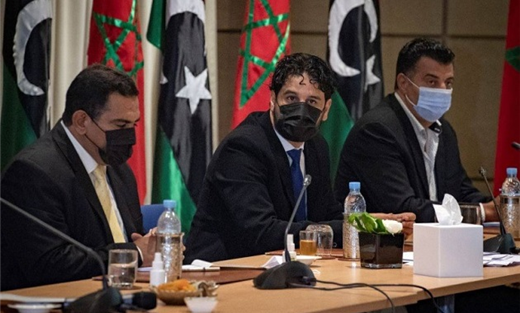
It is noted that negotiations have been ongoing since last September between the Libyan House of Representatives, which is based in Tobruk, and the State Council of the Government of National Accord in Tripoli, after the two sides announced a ceasefire in the country in August.
The participants welcomed the achieved progress in the political, security and economic paths of the Libyan dialogue concerning the Libyan crisis, at the ministerial meeting on Libya in Berlin which is headed by the Secretary-General of the United Nations, Antonio Guterres, and German Foreign Minister Heiko Maas.They renewed their commitment to the outcomes of the Berlin Conference concerning Libya, which was held last January as it was approved by the Security Council in its Resolution No. 2510 of 2020, according to the summary of the meeting which was published on the page of the German Embassy in Tripoli, on facebook.
According to behind-the-scenes of the negotiations, the African Union is still continuing its efforts to hold a Libyan national reconciliation conference in Addis Ababa, stressing the need to work within the framework of the outcomes of the Berlin Conference and the recommendations of Montreux in Switzerland that defined the elements of the political settlement that may be discussed at the next meeting of the Libyan Political Dialogue Forum in late October.
Meanwhile, the recent Hurghada talks in Egypt achieved some changes in the situations of the two parties, an it was the same given concerning the discussions of the Joint Military Committee (5 + 5), in imposing a possible demilitarized zone in and around Sirte, to allow it to become the headquarters of state institutions in the preparatory period which was discussed in Montreux, Switzerland.
The negative impact of the weak Libyan economy on the Libyans’ living conditions is clear, as that is what causes mobilizing libyan to streets. That is why all parties are keen on the importance of ensuring the complete and unconditional lifting of the oil blockade to allow the resumption of oil exports. The participants in the dialogue praised the ongoing discussions on the fair and transparent management of oil revenues among all regions of the country. They also called on the Libyan authorities to make progress on economic reforms, including the reunification of the country’s financial institutions.
Libyan file: The United States of America rearranges its papers
On the other hand, the American side is moving on more than one level, as the US ambassador to Libya, Richard Norland, arrived in Cairo to hold talks with the Egyptian leadership concerning the latest developments in the situation in Libya. He met the Major General Khaled Megawer who is the head of the Egyptian Military Intelligence. Norland expressed his thanks to Egypt for hosting the Hurghada talks among the Libyan military parties, or what is known as the “5 + 5” committee, which achieved respectable success. And he noted that his visit to Cairo may include discussing views on the best way to support the upcoming Libyan political dialogue forum.
The US ambassador to Libya met with the Speaker of the Libyan House of Representatives, Counselor Aguila Saleh, where the two parties discussed unifying the country’s institutions, and agreed to put international control over the central bank. And Washington threatened to impose sanctions against those who put obstacles to the work of Libyan institutions, and called for the unification of the military institution in Libya. It is noted that, in early June, the Commander-in-Chief of the Libyan Army, Field Marshal Khalifa Haftar, visited Cairo together with Parliament Speaker, Counselor Aguila Saleh. And the meeting with the Egyptian leadership resulted in the “Cairo Declaration” initiative to confirm the Libyan will and push for political solutions to the crisis.
Mark Esper who is the US Defense Secretary also arrived on Thursday in Algeria, and this visit is considered as the first for a US defense secretary in nearly 15 years. The US Secretary met with President Abdel Majid Tebboune, where the two sides discussed the situation in Libya and the African coast.
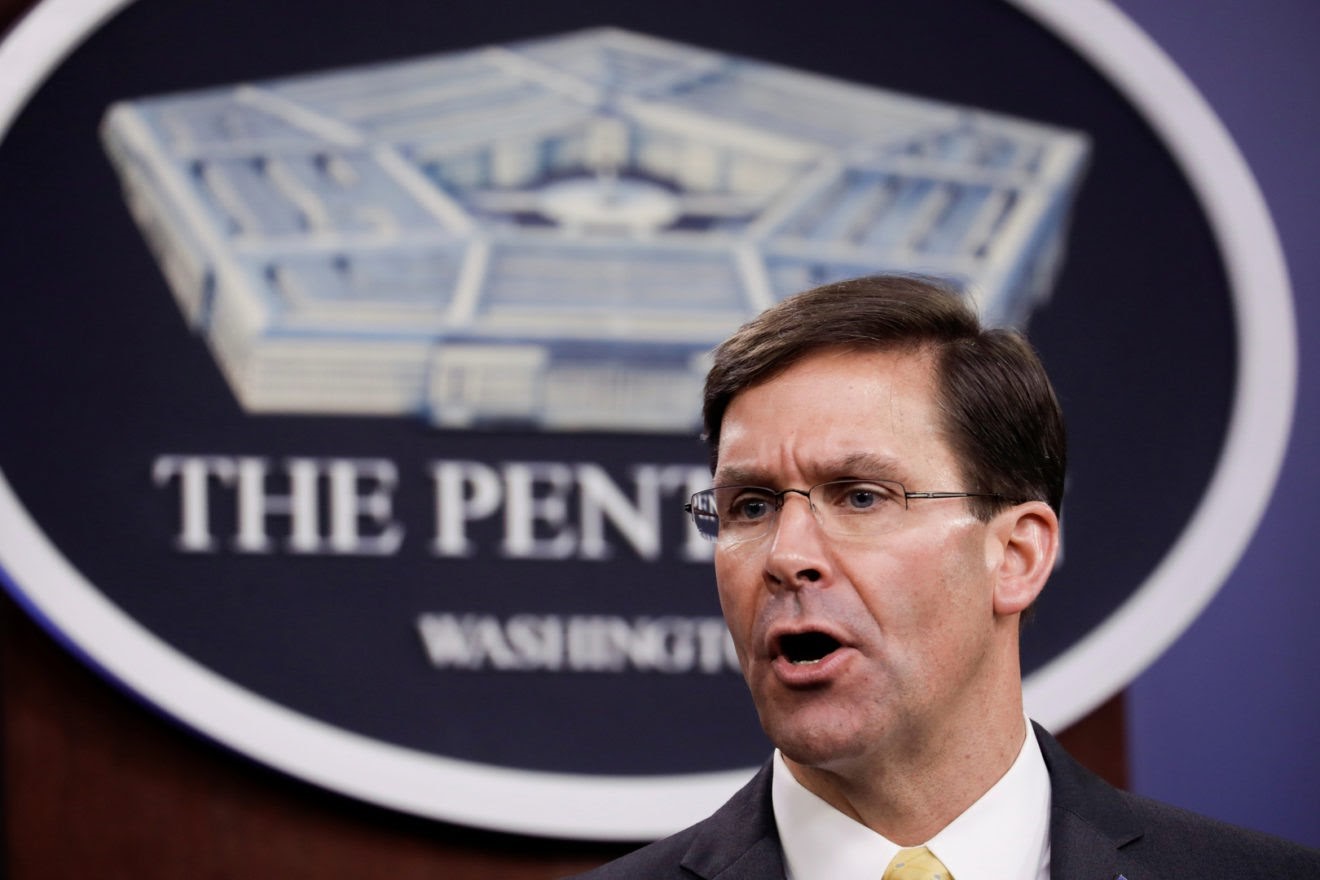
It is reported that the United States of America signed a military agreement with Tunisia for a period of ten years in late September. And the US support for the Tunisian army has also increased to one billion dollars, according to AFRICOM. Which indicates great arrangements for the region from the USA point of view concerning its interests.
On the security level,Fathi Bashagha who is the Interior Minister in Libya’s Government of National Accord (GNA), announced the signing of a memorandum of understanding with the US company “Key to Intelligence” “in the field of financial integrity and combating terrorist financing” according to his tweet on his twitter account. Bashagha said that the signing of the memorandum is due to our priorities that need cooperation with the US company. He explained that the priorities “shall be a national strategy to combat terrorist financing, money laundering, and tracking down its networks, as well as training, equipping and qualifying a department in the ministry that deals with these matters.
On the 10th of August, the Interior Minister together with Al Siddiq Al Kabeer who is the Governor of the Central Bank in Tripoli and the Chairman of the National Committee for Combating Money Laundering and Terrorist Financing, signed a cooperation agreement in the field of combating corruption, money laundering and terrorist financing, in the presence of a number of the departments’ directors from both parties.
The epidemiological situation in Libya is deteriorating, especially after the World Health Organization confirmed several data in this regard. In its latest update, which covers the second half of last September, the World Health Organization indicated that there are large numbers of confirmed cases (infections) of the epidemic in various Libyan cities.Tripoli is in the top of the list, then it is followed by Misurata, Janzour, Zliten and Benghazi, and it has noticed that the municipality of Janzour recorded the highest increase in the number of infections And because of The absence of a death control system in Libya, the organization pointed out in its report that the rate may be greater, as the known number of deaths (551 cases) includes only confirmed “Covid 19” patients who have reports in health facilities. While the true number of deaths from infections is not known in the municipalities. And the organization says that Libya “records 80.19 deaths per million people”
Until the 30th of September, the organization indicated that epidemic text (Polymerase chain reaction PCR) was conducted for 229,253 persons in Libya, and this number includes:
- 160979 persons in Tripoli
- 22833 personsin Misurata
- 17451persons in Benghazi
- 9248 persons in Sebha
- 8721 persons in Zliten
مصر :
ليبيا :
تونس :
This post is also available in:
![]() Arabic
Arabic
